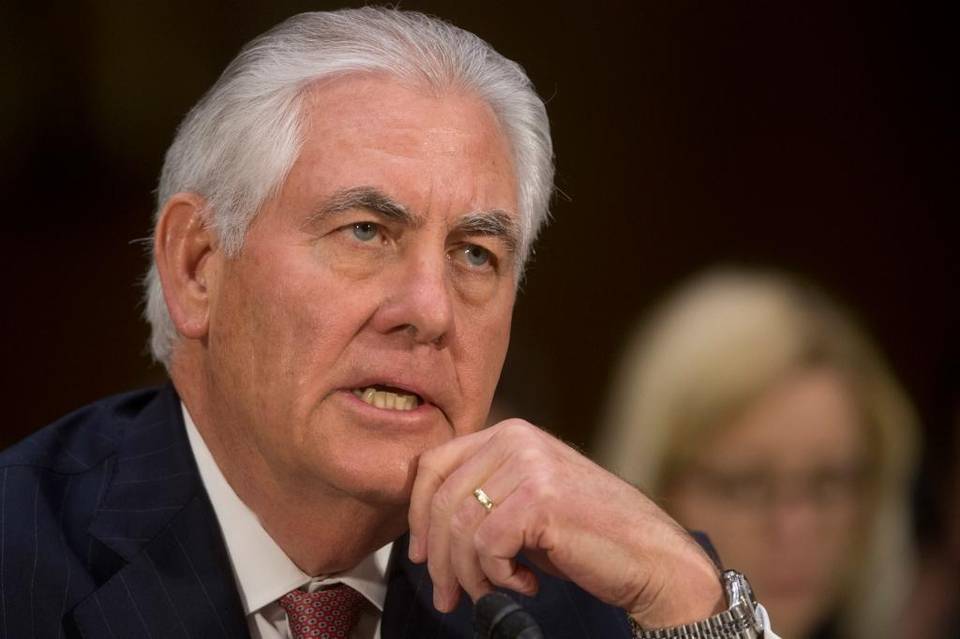By Stuart Leavenworth
 Donald Trump’s nominee to be Secretary of State, former Exxon Mobil CEO Rex Tillerson, testifies before the Senate Foreign Relations Committee in Washington on Wednesday, Jan. 11.
Donald Trump’s nominee to be Secretary of State, former Exxon Mobil CEO Rex Tillerson, testifies before the Senate Foreign Relations Committee in Washington on Wednesday, Jan. 11.
Rex Tillerson, the former Exxon Mobil CEO tapped to be the Trump administration’s secretary of state, created an international stir this week when he told a Senate confirmation hearing that the United States should prevent the Chinese military from accessing artificial islands Beijing has constructed in the South China Sea.
But it’s not the first time he’s riled China.
But it’s not the first time he’s riled China.
Under his leadership, Exxon has teamed up with Vietnam, China’s enemy to the south, to develop natural gas projects in waters claimed by both Hanoi and Beijing.
On Friday, Exxon signed one of those deals with Vietnam.
Ironically, it was Secretary of State John Kerry who made the announcement.
“Our countries have worked hard to put the past into the past and to define a different future,” Kerry said at meeting in Hanoi with Vietnamese Prime Minister Nguyen Xuan Phuc.
“Our countries have worked hard to put the past into the past and to define a different future,” Kerry said at meeting in Hanoi with Vietnamese Prime Minister Nguyen Xuan Phuc.
“We are now cooperating on security issues . . . and just today a $5 million agreement was signed with Exxon to explore and develop gas and fuel possibilities.”
The agreement allows Vietnam and Exxon to go forward with “Blue Whale,” Vietnam’s largest natural gas and oil project and one that would be built in disputed waters.
The agreement allows Vietnam and Exxon to go forward with “Blue Whale,” Vietnam’s largest natural gas and oil project and one that would be built in disputed waters.
The project is expected to fuel four power plants in Vietnam when it is completed by 2023.
China has not sat by as Vietnam has exercised its energy rights off its coast.
China has not sat by as Vietnam has exercised its energy rights off its coast.
In 2014, China placed an exploratory rig near Vietnam, setting off skirmishes between fishing boats and the Chinese coast guard.
If Tillerson were to be confirmed as the top U.S. diplomat, and if China responded strongly to the Blue Whale project, he would be in the akward position of either involving himself in an Exxon project he helped developed, or staying on the sides of a budding crisis in the South China Sea.
During his confirmation hearing, Tillerson was anything but guarded in his comments about China, which has been dredging sand onto barely submerged reefs in the region and developing airfields and deep harbors on some.
If Tillerson were to be confirmed as the top U.S. diplomat, and if China responded strongly to the Blue Whale project, he would be in the akward position of either involving himself in an Exxon project he helped developed, or staying on the sides of a budding crisis in the South China Sea.
During his confirmation hearing, Tillerson was anything but guarded in his comments about China, which has been dredging sand onto barely submerged reefs in the region and developing airfields and deep harbors on some.
Beijing asserts that most of the South China Sea is its "historic" territory, a claim rejected by an international tribunal last year.
Under questioning from the Senate Foreign Relations Committee, Tillerson said that China’s actions in the South China Sea were “extremely worrisome” and comparable to Russia’s annexation of Crimea.
“You’re going to have to send China a clear signal that, first, the island-building stops, and second, your access to those islands is also not going to be allowed,” said Tillerson.
Chinese state media reacted strongly to his statements, including criticism that China hasn’t been a reliable partner in pressuring North Korea.
“Such remarks are not worth taking seriously because they are a mish-mash of naivety, shortsightedness, worn-out prejudices, and unrealistic political fantasies. Should he act on them in the real world, it would be disastrous,” said an opinion column in the China Daily on Friday.
U.S.-China relations are likely to become tense under Trump.
Under questioning from the Senate Foreign Relations Committee, Tillerson said that China’s actions in the South China Sea were “extremely worrisome” and comparable to Russia’s annexation of Crimea.
“You’re going to have to send China a clear signal that, first, the island-building stops, and second, your access to those islands is also not going to be allowed,” said Tillerson.
Chinese state media reacted strongly to his statements, including criticism that China hasn’t been a reliable partner in pressuring North Korea.
“Such remarks are not worth taking seriously because they are a mish-mash of naivety, shortsightedness, worn-out prejudices, and unrealistic political fantasies. Should he act on them in the real world, it would be disastrous,” said an opinion column in the China Daily on Friday.
U.S.-China relations are likely to become tense under Trump.
On the campaign trail, Trump has accused China of “raping” the United States and has threatened to slap Chinese goods with a 35 percent tariff if Beijing doesn’t change its ways.
So far, Chinese officials have been less bellicose than state media in responding to Trump.
So far, Chinese officials have been less bellicose than state media in responding to Trump.
Aucun commentaire:
Enregistrer un commentaire